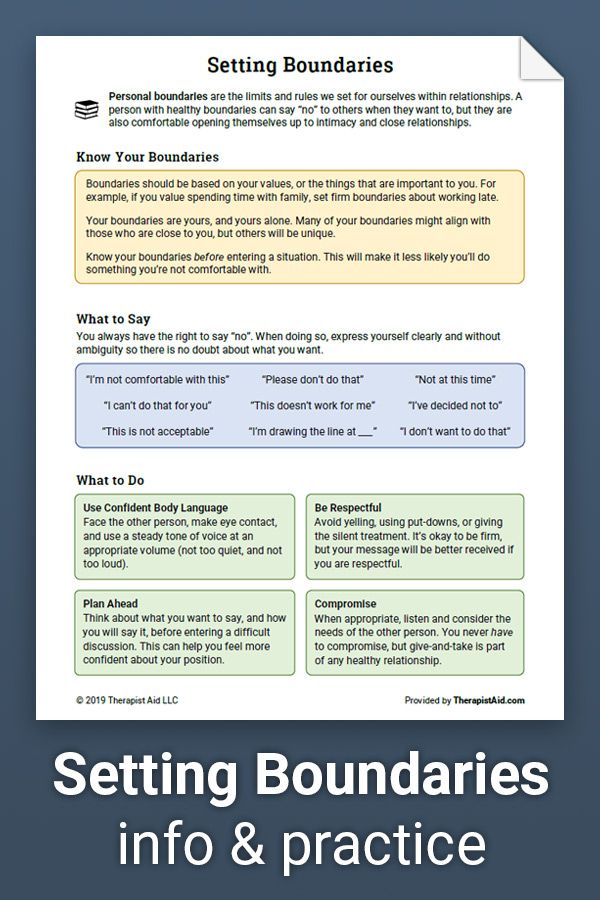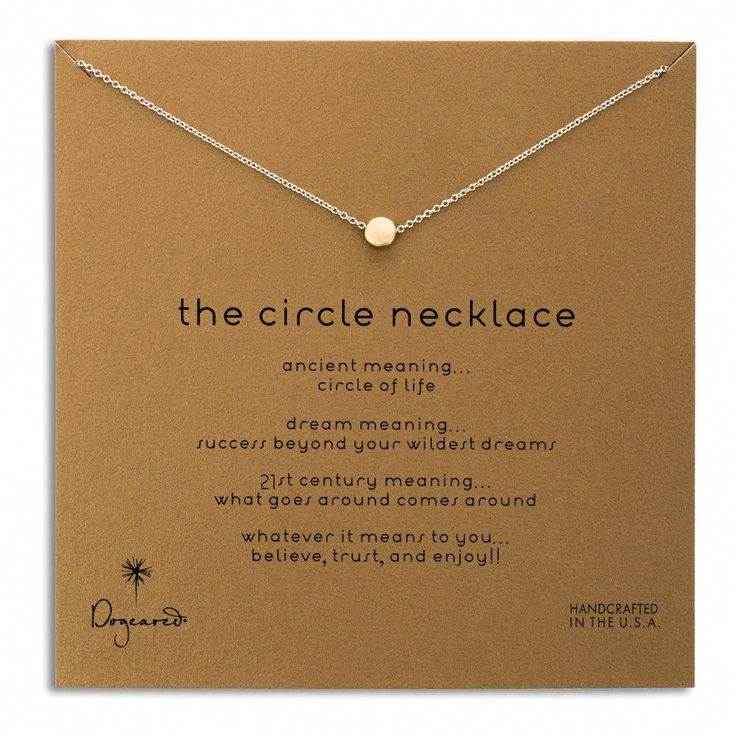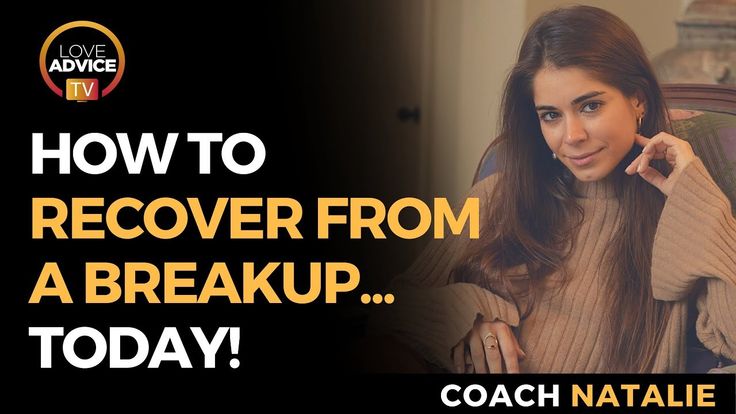How to set boundaries with an ex
11 Boundaries For Being Friends With An Ex
It happens. You fell out of lust with your significant other.
Something extinguished the flame, but you still love and respect your former partner as a buddy.
So now you’re wondering how to stay friends after a breakup.
Is it even possible?
Fortunately, yes, it is.
But making a smooth transition from lovers to pals requires a bit of boundary setting.
So today, we’re unpacking the rules for being friends with an ex.
What's in this post:
- Is It Healthy to Be Friends with An Ex?
- Setting Boundaries With an Ex
- How Do You Maintain Your Boundaries With Your Ex?
- 11 Boundaries For Being Friends With An Ex
- 1. Stay Far Away From Their Love Life
- 2. Don’t Flirt
- 3. Don’t Jump Back Into Bed
- 4. Let Bygones Be Bygones
- 5. Give Each Other Space
- 6. Ignore the Haters
- 7. Keep Things Casual at First
- 8.
Establish Emotional Shields
- 9. Keep Things Civil on Social Media
- 10. Don’t Be Overly Available
- 11. Be Flexible
Is It Healthy to Be Friends with An Ex?
Is it healthy to remain friends with an ex? It depends.
Was the relationship volatile? Is the other personal manipulative or toxic?
Will having them stay in your life cause difficulties?
Are you holding on for the wrong reasons? If you can honestly assess the situation and answer “no” to all these questions, then moving forward with a friendship is probably fine.
If not, think long and hard before embarking down “Pal Path.”
Setting Boundaries With an Ex
Setting personal limits is an integral part of maintaining healthy relationships and good mental health — but it takes practice.
Successful boundary establishment involves five steps.
- Engage in Self-Reflection: People usually leave this step out, but it’s probably the most important.
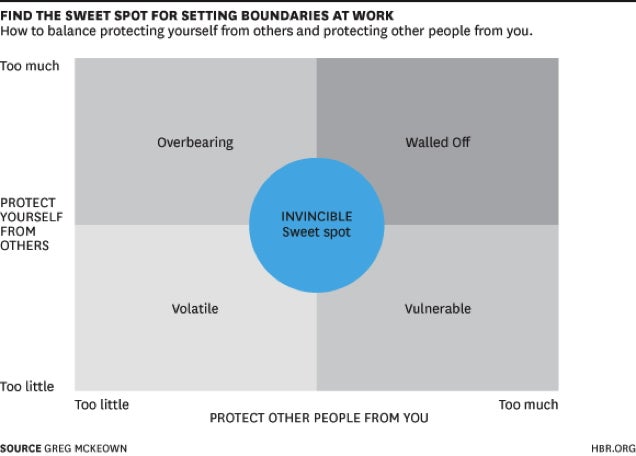 Before you accuse other people of being the problem, first assess your role in the situation. Are your faults a contributing factor? Think long and hard about this question before moving on to the next steps.
Before you accuse other people of being the problem, first assess your role in the situation. Are your faults a contributing factor? Think long and hard about this question before moving on to the next steps. - Determine Your Boundaries: Now is the time to determine your boundaries. A list of 11 suggestions is below. However, you know your relationship, so tailor them to your situation.
- Discuss Them with Your Ex: The wrong thing to do is not tell the other person about your “new rules.” And you definitely shouldn’t dictate them in an authoritarian manner. After all, you’re not a jerk, right? Instead, have a friendly and thorough discussion with your ex about why you need to set some boundaries and then delineate them. Try to be as cheerful, upbeat, and kind as possible.
- Be Consistent: Once everything is set, stick to the plan. Blurring the lines does not help the situation.
- Carry Your Rules to Social Media: Remain mindful of your social media behavior.
 Your boundaries should apply online and off.
Your boundaries should apply online and off.
How Do You Maintain Your Boundaries With Your Ex?
You probably landed here because you’re wondering how to be friends with an ex. As we’ve already established, boundary setting is critical. But before that can commence, clearing the emotional deck is a must.
How do you accomplish that? Here are the four steps.
- Grieve the Relationship: The end of a romantic relationship is like a death, and mourning its passing is appropriate.
- Expunge Residual Feelings: Ridding yourself of lingering amorous attachments is a top priority before starting a friendship with your ex. It’s impossible to maintain healthy, platonic relationships with people when you’re still lugging around feelings for them.
- Cultivate Self-Confidence: The next step is rebuilding your self-confidence. Insecurity can take us to dark places and cause us to act out — neither of which supports the development of a budding friendship.

- Determine Why You Want To Remain Friends: Be honest: Why do you want to remain friends with your ex? Is it because you’re afraid of losing them or genuinely like them? If it’s the former, lick your wounds and move on.
11 Boundaries For Being Friends With An Ex
We’ve gone over some general questions about how to remain pals with an ex and talked about the necessary prep work.
Now, let’s examine the nuts and bolts of developing a friendship framework.
1. Stay Far Away From Their Love Life
If you want to remain friends, staying far from your ex’s love life is the number one rule.
Romance wasn’t in the cards for you two, so leave the topic in the wind. It’s safer.
Jealousy is typically irrational, and even though you separated amicably, the green-eyed monster may rear its nasty head if you become entangled in each other’s love lives.
Sure, if it’s been a few years, and you’re way over each other, then casual conversations about your respective lovers are fine. But remember that it also may be difficult for new partners to spend time with your ex — so be sensitive to their needs and emotions.
But remember that it also may be difficult for new partners to spend time with your ex — so be sensitive to their needs and emotions.
2. Don’t Flirt
Don’t tempt fate by flirting. It can trigger old feelings for one of you, which leads to awkwardness and a lop-sided relationship. When that happens, it’s challenging to remain buddies.
At first, this rule can be challenging to keep because you’re used to each other. Plus, it may be instinctual. But do your best to keep it under wraps.
3. Don’t Jump Back Into Bed
We get it. You’re in the mood for some loving, and your ex is “safer” than a one-night stand. So you think: Why not? Stop!
Do not pass go! Jumping into bed will only complicate matters. If one of you catches feelings again and the other doesn’t, a world of hurt awaits.
Plus, reinitiating intimacy smears lines, which only causes problems down the line.
4. Let Bygones Be Bygones
Grudges are heavy and have a way of distorting your perceptions.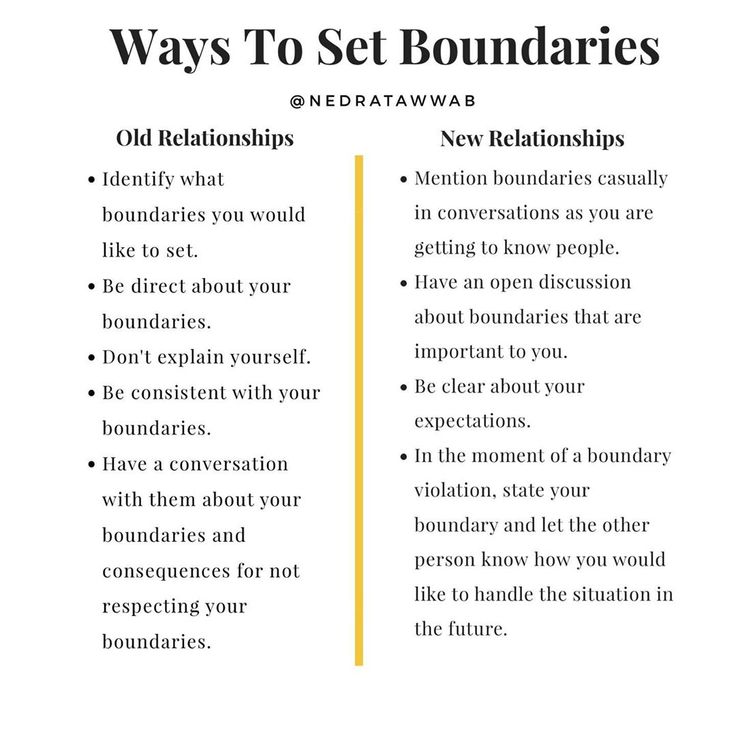 They fester, metastasize, and often explode when you insist on carrying them around. So take Elsa’s advice and let it go!
They fester, metastasize, and often explode when you insist on carrying them around. So take Elsa’s advice and let it go!
Remember that we all make mistakes and occasionally make terrible choices. If you want to hold on to a friendship with your ex, forgiveness is a key ingredient.
5. Give Each Other Space
When first transitioning from partners to friends, give each other space. Failing to do so will complicate matters. Instead of hanging out alone, plan group activities. Having other folks around eases potential tensions.
Also, there’s no need to call or text each other daily. Don’t be a social media stalker, either.
6. Ignore the Haters
There will always be people who will snarl and sneer and insist you shouldn’t attempt to befriend your ex.
They’ll regale you with stories about their former roommate’s cousin’s aunt who tried to do the same and ended up in a horrible situation.
Look, you know your relationship better than anyone else.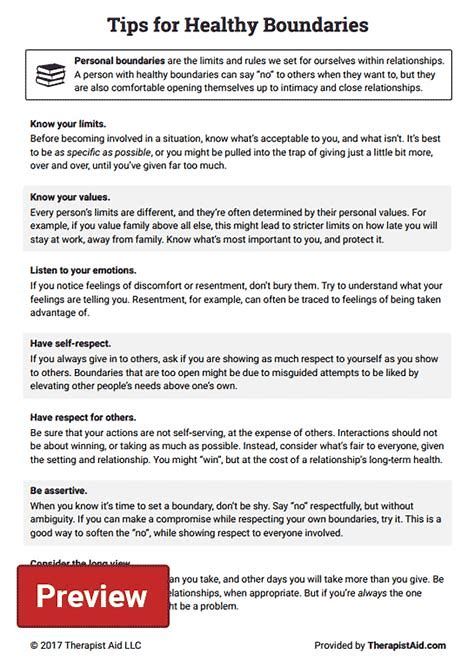 Sure, sometimes, you may lose perspective, at which point a gentle nudge from close friends could be appropriate. Otherwise, brush off the negativity and give the friendship a shot.
Sure, sometimes, you may lose perspective, at which point a gentle nudge from close friends could be appropriate. Otherwise, brush off the negativity and give the friendship a shot.
Hey, if you’re anything like Veronica and Tim of 90-Day Fiance fame, you may discover your former lover fits much better in your life as a best friend.
More Related Articles
If You Want To Know If Your Ex Is Miserable Without You, Look For These 21 Signs
Do You Have Unhealthy Boundaries With Your Ex-Wife? 11 Examples Of What Not To Do Or Say
Is Your Ex Lurking Around On Your Social Media? 17 Signs They Are Trying To Get Your Attention
7. Keep Things Casual at First
The road from partners to friends usually works best when you start slowly. It’s akin to a couch potato training for a marathon. If you slap on sneakers the first day and attempt to run 8 miles, the probability that you’ll crash and burn is close to 100%.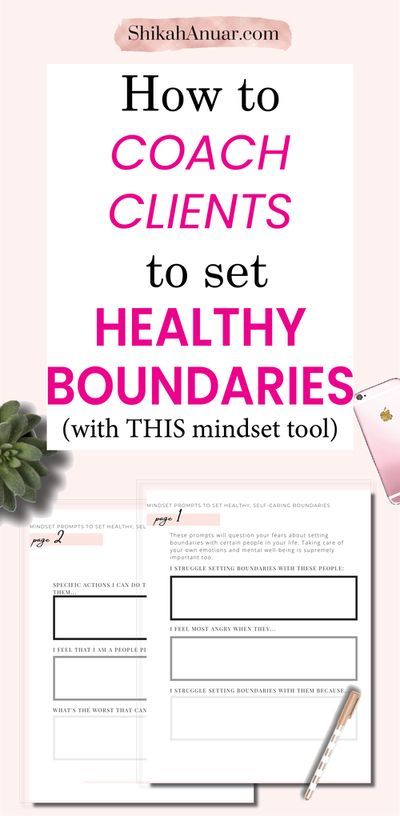
In the beginning, walk, don’t run. Keep things casual. Over time, you’ll get better at just being friends.
8. Establish Emotional Shields
Love, they say, is a “many-splendored thing” — and emotions are a “many-complicated thing.” When they go haywire, life can be bumpy. If the relationship was serious, it might be wise to enlist a therapist to help you sort through your feelings. If counseling isn’t your jam, consider diving into some self-help books.
The goal is to acquire tools to help you better navigate the situation and protect your self-confidence.
Social media can be dangerous when we let unwieldy emotions lead the way. Sometimes, when we’re inside our feelings — or have had too much to drink — we say things in public forums that would better left on the cutting room floor.
So if you’re hurting, establish a self-boundary and stay off social media until you’re feeling like yourself again. It will save you lots of embarrassment, allowing the friendship to progress in a much healthier manner.
10. Don’t Be Overly Available
It may sound old-fashioned, but desperation doesn’t look good on anyone. Yes, we all go through it at some point or another, but it’s one of those things that turns people off.
If you’re trying to be friends with your ex, and you’re always at their beck and call, they may try to take advantage of your eagerness and start treating you like crap. Or, they may decide that being friends with you isn’t worth it.
Keep things on an even keel by holding time and space for yourself.
11. Be Flexible
This may sound counterintuitive, but flexibility is the last “boundary” — if you can even call it that. Frameworks are great. Rules are great.
But being too rigid can also cause problems. The most important thing is to do what works for you!
Transitioning from partners to friends is absolutely possible if both parties are game. Create a playbook and stick to it as closely as possible, but also make room for life’s little hiccups.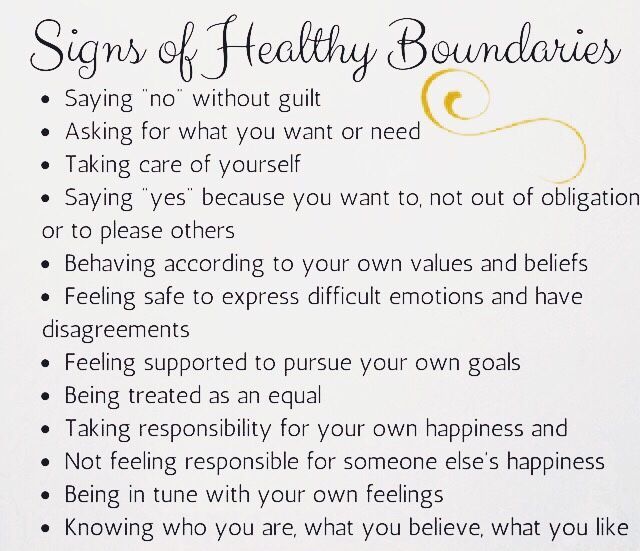
Keep a positive outlook and your goal in sight. If you do, you might just find yourself with a great new friend.
Good luck!
How to Set Healthy Boundaries With Your Ex
Relationships
- Copy By: Beth Gillette
- Feature Image By: Bogdan Sonjachnyj | Shutterstock
It feels like just yesterday I was writing an intro about how I went on an amazing date… and now, I’m here to say I was dumped. Ha ha ha ha. Is The Everygirl my personal diary at this point? Maybe.
Navigating a breakup and dealing with the aftermath of how you’ll remain friends (if you even will), what you’ll do if you see each other, how you handle social media, and more is enough to make us all stay in sh*tty relationships forever. It’s hard (and honestly way more effort than any of us want to put in) to figure out the nitty-gritty details of post-breakup life, especially when we’re dealing with how the heck we’re even going to live without this other person we’ve likely built our life around and potentially imagined a future with. But we can’t stay in this cycle of confusion and stress forever.
But we can’t stay in this cycle of confusion and stress forever.
Because I also didn’t quite know how to tackle this issue (I’m learning right here with ya, Everygirls), I sought out some expert advice on why we should set boundaries and how to actually get it done. I spoke with Heidi McBain, a mental wellness counselor who focuses on women’s mental wellness, all about breakups — here was her biggest advice:
Give yourself time and ask for help
We all know that you need a little time to heal after a breakup, but this time is especially important if you plan to stay friends or keep a relationship. McBain explained the importance of grieving and understanding that a breakup is a loss, even if you were the one to make the call. “It’s not only a loss of how you hoped things would turn out in the present, it’s also a loss of future hopes and dreams attached to this relationship as well,” McBain said.
Taking time for yourself doesn’t have to be a month of face masks and spa visits and Netflix movie nights in.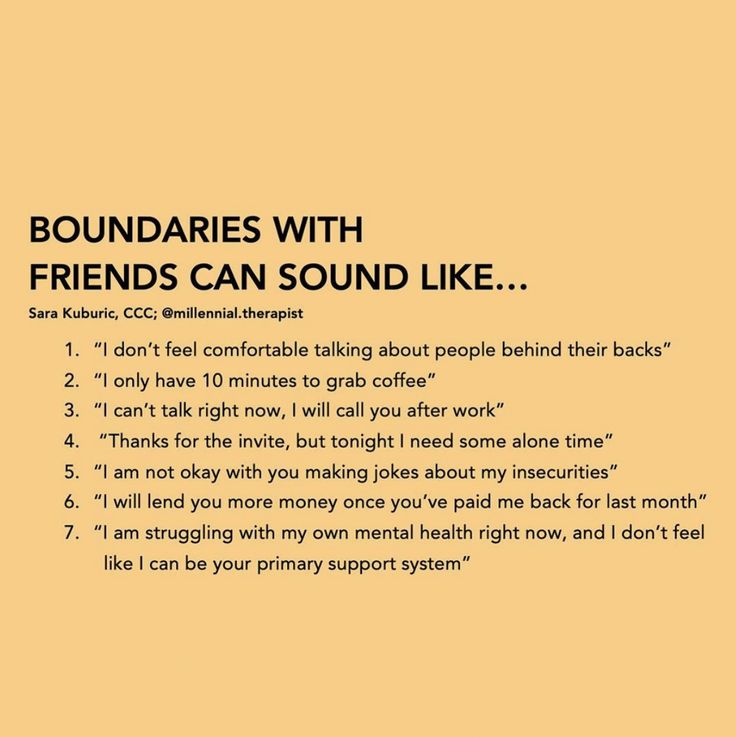 McBain suggested seeing a therapist or discussing the grief of this relationship through therapy. She said it could be a great place to grieve as well as process what went wrong and what went right with that relationship so you don’t make the same mistakes in the future.
McBain suggested seeing a therapist or discussing the grief of this relationship through therapy. She said it could be a great place to grieve as well as process what went wrong and what went right with that relationship so you don’t make the same mistakes in the future.
Understand why you need boundaries
If you think you and your ex don’t need to set boundaries, then you and I have a lot in common, and one of those things is that we’re wrong. Setting boundaries is important for any relationship, especially one that’s just ended. “Establishing healthy boundaries with an ex give you both space to grieve the loss of the relationship early on, but also gives both of you space so that you can also move forward and start to date other people (when you’re ready to do so),” McBain said.
Boundaries are there to help the two of you navigate the breakup and whatever remaining relationship you want to have. Are you still going to talk? How often will you text or call each other? Will you follow each other on social media? How will you navigate being together in social settings or hanging out with mutual friends? Will you unfriend/unfollow their family or friends on social media? There are dozens of situations that will change after a breakup, and while it may seem awkward, setting expectations of how you both will act will make it much easier in the long-run.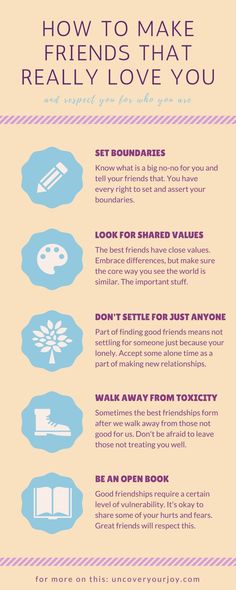
Talk to them
When the time feels right, you should be able to talk to your ex about the boundaries you want to set, and they should be able to discuss it with you too. Your opinions and ideas might differ, and that’s OK. Focus on compromising in a way that is beneficial, easy, and works for the both of you. According to McBain, this conversation should be “open and honest.”
Block them if you need to
If seeing your ex on Instagram or noticing that they watched your stories is causing you stress, it’s OK to block them from your story or block their account altogether. Focus on your mental health here instead of worrying that blocking them will cause a riff in your relationship. According to McBain, if the other person isn’t respecting the boundaries that you’re setting, blocking them and taking more time for yourself might be a good next step.
However, she also suggests paying attention to your intentions. If you’re blocking them to show them up or be petty (guilty!), that’s a different situation. Also, if you’re only planning to temporarily block them, pay attention and set a timeline of when you’ll unblock and reevaluate your social media relationship. Don’t be afraid to talk to them about this. They should be understanding that having them as a friend or following them on social media can be triggering to you and that it’s about your mental well-being.
Also, if you’re only planning to temporarily block them, pay attention and set a timeline of when you’ll unblock and reevaluate your social media relationship. Don’t be afraid to talk to them about this. They should be understanding that having them as a friend or following them on social media can be triggering to you and that it’s about your mental well-being.
- Tweet
- Pin
Set Healthy Boundaries: 10 Steps
118,666
Man among men Practices how to
What does it look like? For example, you are talking on Skype with a friend at midnight, because it is more convenient for her. Or give a ride to a colleague who, as soon as he sits down, habitually lights up in your car.
You and your husband are going on vacation to a place where it rains and where pike is excellently caught. You don't even realize that your boundaries are being crossed even when they are taunting you or joking about your size.
Some of us are reluctant to set clear boundaries because we believe that doing so can offend those around us.
Others set them up in such a way as to stake out part of someone else's territory.
But remember that there is that part of your "I" that needs to be protected from any encroachment, something that belongs only to you. Your emotional health, what you believe in, what you won't let outsiders touch.
What are these boundaries and why are they needed? Most simply they are defined by the words "my business" - "your business". By setting boundaries, we first of all decide for ourselves what behavior towards us will be reasonable and safe for us, will not destroy us as a person.
They are not designed to get someone to do something. We set them for ourselves, and in this way we show that we are responsible for our own destiny, for what is permissible and what is unacceptable to do in relation to us. But for this you need to know exactly who we are and what our true "I" is.
We understand where we end and another begins. We are responsible for ourselves and only ourselves. This is where every healthy person starts.
It is almost impossible to manipulate a person who is clearly aware of his personal boundaries and has clearly marked them for others.
Determine if these boundaries are violated:
Physical boundaries
The very first, basic boundary for us is our skin. Important concepts that define your physical boundaries are physical space and personal space. Ask yourself the following questions to see if your boundaries are being violated by others.
Who is allowed and who is not allowed to touch you and how? What do you consider only your personal space that needs to be protected?
Do you have a place in your house where you can be alone?
Sexual Limits
Find your personal level when sexual activities and touching are comfortable for you. Only you determine what is acceptable and what is not, where, when and with whom. Stick to these boundaries and don't be silent when they are violated.
Stick to these boundaries and don't be silent when they are violated.
Material boundaries
What do you think is permissible and what are not permissible in relation to your property?
What can you give as a gift? Borrow?
How much money do you allow yourself to borrow? Do you allow strangers to use your car, clothes, apartment? It is only you who determines this, and for different people these boundaries can be very different.
Who enters your house? Who wouldn't you like to see?
The same goes for your children's friends: which rooms in your house are not open to guests?
Do guests take off their shoes? Do they eat and smoke in your car? All these are things that should be determined only by you as the owner of the house.
Emotional boundaries
You are responsible for your feelings, but others are also responsible for their feelings. Don't let anyone take it out on you or make comments about your weight, appearance, or age. And don't do it yourself. Healthy emotional boundaries keep you from blaming or taking someone else's accusations personally. And also feel guilty for someone's decisions or problems and give unsolicited advice.
And don't do it yourself. Healthy emotional boundaries keep you from blaming or taking someone else's accusations personally. And also feel guilty for someone's decisions or problems and give unsolicited advice.
A border no one knows about is not a border
If you make excuses and argue or defend yourself, this is also an indicator of weak emotional boundaries. “I’m sad, I’m angry, I’m scared…” Are you able to respond to these feelings of yours immediately and calmly accept them? If you ignore them when they first appear, if you think you shouldn't have these feelings at all, your body will turn up the volume until you hear them.
Spiritual boundaries
What is important to you in life? What do you believe? As in all the previous ones, these boundaries must be felt and realized when they are crossed.
Intellectual boundaries
Your values, opinions, thoughts. They are only yours. And each individual decides what he wants to share with others, and what to leave unsaid. What do you believe? Can you listen with an open heart to those who express a different opinion, and at the same time without prejudice, without compromising your core beliefs?
What do you believe? Can you listen with an open heart to those who express a different opinion, and at the same time without prejudice, without compromising your core beliefs?
There are two more things that belong only to you. These are your words and your time.
Remember: "no" is the most basic boundary and a complete, extended sentence.
Healthy boundaries are not:
- set for us by someone else;
- hurt us;
- are rigid and immovable;
- invade our personality.
10 laws of healthy boundaries
1. All actions have consequences. If someone in your life showed violence, cruelty, selfishness towards you, did you set boundaries? Or does it all happen over and over again with no consequences for them?
2. The law of responsibility. We answer to each other, but not to each other. This means not encouraging or provoking anyone's infantile behavior.
3. Power has limits. We have power over some things, but we do not have the power to change other people. We only have the power to change our own lives.
Power has limits. We have power over some things, but we do not have the power to change other people. We only have the power to change our own lives.
4. The law of respect. If we want others to respect our boundaries, we must respect theirs too.
5. Freedom of choice. We should be free to say "no" or say "yes" with a pure heart. You can’t love a person just because you feel sorry for him and he leaves you no other choice.
6. We need to evaluate the pain of setting our boundaries for others . Do our boundaries cause pain that will then lead to healing and growth? Or the pain that only hurts them?
7. Law of proactivity. We take active steps to solve problems based on our values and desires. Proactive people defend their freedom and express disagreement, but without raising an emotional storm.
8. The law of envy. We will never get what we want if we set our limits based on what others have.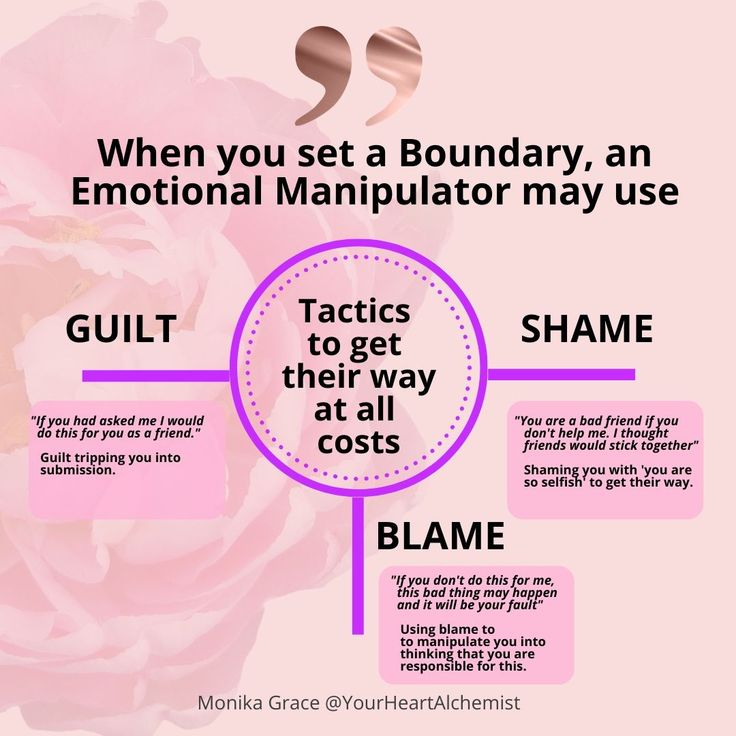 An envious person simply does not see his boundaries based on the choices that he has.
An envious person simply does not see his boundaries based on the choices that he has.
9. Law of activity . Don't wait for others to make the first move.
10. You need to communicate your boundaries. A border that no one knows about is not a border. We must make it very clear to the other what we want and what we do not want, what we will tolerate and what we will not. We must also make it clear that every violation of boundaries has consequences.
Text: Maria Malygina Photo Source: Getty Images
New on the site
Test: What does your choice of car say about you
“My friend tells her mother all our conversations. How can I stop this without offending her?
"A man gets mad when I ask him for advice about work"
"How do I look during sex?" It turns out that this question concerns not only women
Getting out of the abyss of despair: 3 main steps
“Either my daughter and I, or her”: the story of one ultimatum
Dry cough: psychosomatics and treatment
“Constant conflicts at work, because all my colleagues piss me off terribly”
How to build personal boundaries with exes
back
next
Relationships November 21st
tiny. Created with sketch-logoreated
Created with sketch-logoreated How to properly build personal boundaries with your ex
It seems that you parted ways with your crash as friends:
discussed all the reasons, drew conclusions and promised to tenderly cherish the image of each other in your memory. But what if things don't go according to plan? We tell you how to properly set personal boundaries with your now ex.
Gestalt Therapist and Mango Project Expert*
When two people separate, the boundaries in their relationship inevitably change.
Therefore, during a break-up, you and your partner need to formulate new rules for your communication. If these rules are regularly violated, then there is trouble with personal boundaries.
What kind of violations of personal boundaries with the former can occur?
Boundaries can be violated for various reasons. For example, for one of the participants, the relationship did not actually end. And he behaves the way he did in these relationships before.
And he behaves the way he did in these relationships before.
Let's say you used to talk on the phone every evening. Now you broke up, but your ex continues to call - this is a violation of the boundaries set by both of you.
Why is it important to defend borders?
Because otherwise they can and will be violated. If, for example, your ex, out of old habit, comes to visit you without an invitation, and you are not very happy and do not voice it, nothing will change.
How to correctly set boundaries and not offend anyone?
First option: formulate new agreements about how you now communicate - and whether you communicate at all. When parting, couples rarely agree, and therefore difficulties arise.
Second option: no way. Because even clear agreements do not guarantee that someone will not remain offended.
How to understand that the boundaries are violated anyway?
In theory, it's very simple - a person ignores general agreements and restricts your freedom.